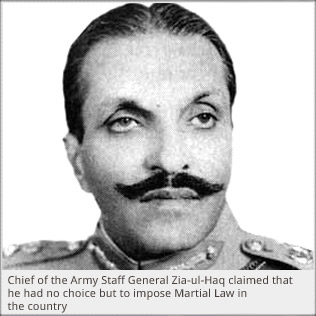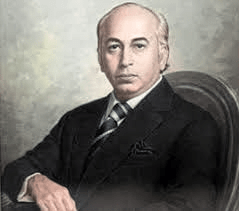Ever since Zulfiqar Ali Bhutto took over the responsibilities of governance, there was a strong group in the country that was not ready to accept him. They considered him as one of the players who were involved in the dismemberment of Pakistan. This hatred was further enhanced by the authoritarian style of his governance. His policy of suppressing the opposition and interference in the affairs of the Provinces proved to be the major factor for the unity of the rightist and the leftist political parties against him. As early as March 1973, opposition parties in the National Assembly set a common platform, called United Democratic Front, to counter the anti-opposition steps of Bhutto’s Government. However, the opposition emerged as a significant force against Bhutto at the macro level for the first time when elections were announced in January 1977. The opposition decided to join hands against Bhutto and contest the election from a common platform, the Pakistan National Alliance.
Formation of P. N. A. proved to be the beginning of the decline of Bhutto. During the elections, the Establishment showed its biased attitude towards P. N. A. which made the Alliance even more popular among the masses. Most of the public meetings of P. N. A., especially in the big cities like Karachi, Lahore and Rawalpindi, were immensely successful. Yet the result of March 7 elections astonished everyone as P. P. P. swept the polls and P. N. A. was only able to win 36 seats in the National Assembly. P. N. A. leadership did not accept the results and accused the Government of systematic rigging. P. N. A. Executive Council decided to boycott the Provincial Assemblies’ polls and demanded for immediate resignation of Bhutto, replacement of the Chief Election Commissioner, and fresh election of National Assembly seats under the supervision of Judiciary and the Army.
When Bhutto refused to accept the demands of P. N. A., leadership of the Alliance decided to bring the people onto the streets, to break law deliberately, and to confront the police and the security forces. P. N. A. leaders called upon the people to stage countrywide strikes and organize protest marches. The followers fully responded to the call and a full-fledged political movement started. The business community wholeheartedly joined Alliance. P. N. A. used mosques to stimulate the masses and tried to create an impression that they were only working for the enforcement of Nizam-i-Mustafa. They criticized the socialistic attitude of Bhutto and alleged that he had lost his faith in Islam. The ulema whipped up emotions for a Jihad to save Islam, which they thought was in danger from an evil regime. The bar associations across the country also began to register their strong protest against the electoral fraud and denounced the post-election policy of repression.
 Initially Bhutto put a deaf ear to the demands of P. N. A. and debunked opposition’s charges that his landslide victory was a result of rigging. He used police and F. S. F. against Alliance’s activities and its top leadership was arrested and put behind the bars. Martial Law was enforced in three main cities of Karachi, Lahore and Hyderabad. Curfew was imposed in the rest of the big cities of the country and Army was called to maintain law and order.
Initially Bhutto put a deaf ear to the demands of P. N. A. and debunked opposition’s charges that his landslide victory was a result of rigging. He used police and F. S. F. against Alliance’s activities and its top leadership was arrested and put behind the bars. Martial Law was enforced in three main cities of Karachi, Lahore and Hyderabad. Curfew was imposed in the rest of the big cities of the country and Army was called to maintain law and order.
However, the intensity of the situation made Bhutto realize that it was not possible to suppress the movement by force. In the beginning of May, Bhutto changed his policy and started to explore the option of a dialog. Some P. N. A. leaders were released and brought to Sihala for negotiations in the first week of June. Bhutto showed his willingness to hold elections in November 1977, and offered five ministries to the P. N. A. candidates during the interim period. But P. N. A. team insisted on 50 percent representation in the Cabinet and demanded elections before August 14. Bhutto eventually accepted almost all the demands of P. N. A. and the stage was set for a compromise. Signing of the agreement was held in abeyance as he went abroad for a tour of Saudi Arabia, Libya, U. A. E., Kuwait and Iran. His tour was termed as dilatory tactics and again there seemed to be a deadlock.
It was in these conditions that Chief of the Army Staff, General Zia-ul-Haq, imposed Martial Law in the country on July 5, 1977, and sent Bhutto behind the bars. General Zia said, “Had an agreement reached between the opposition and the Government, I would certainly never have done what I did”.
This article was last updated on Sunday, June 01, 2003






